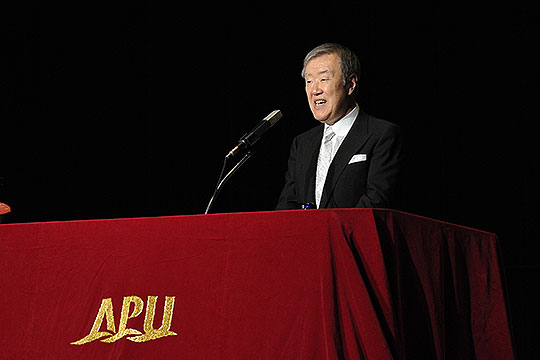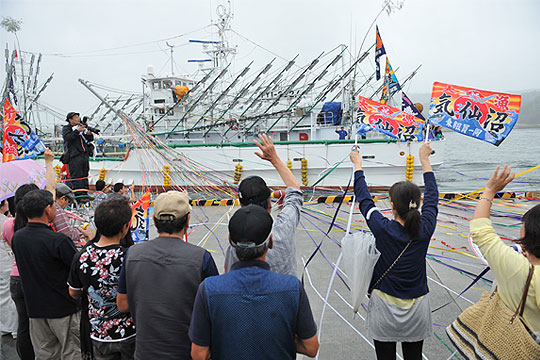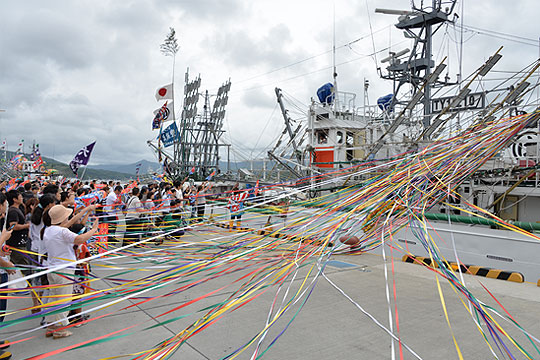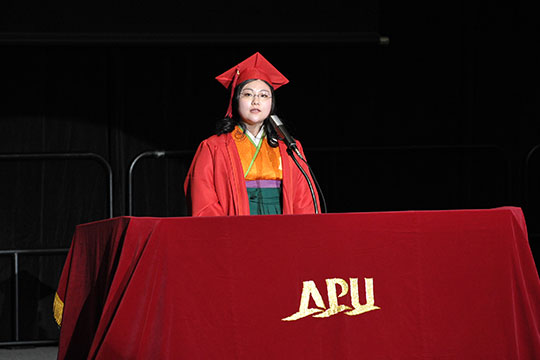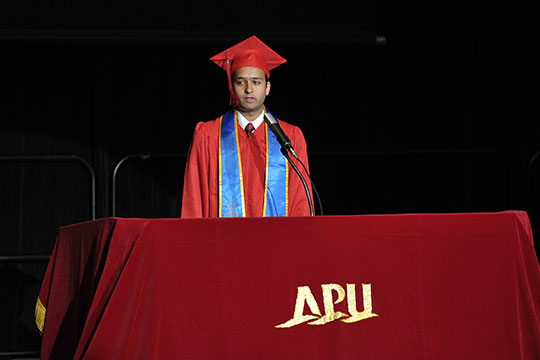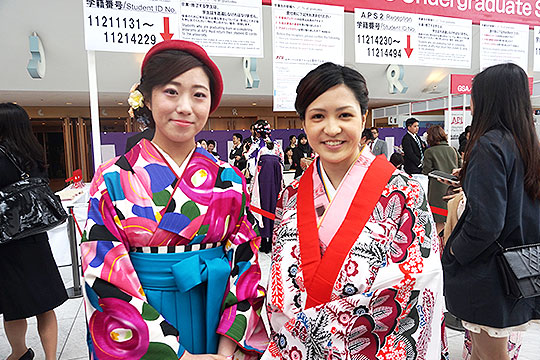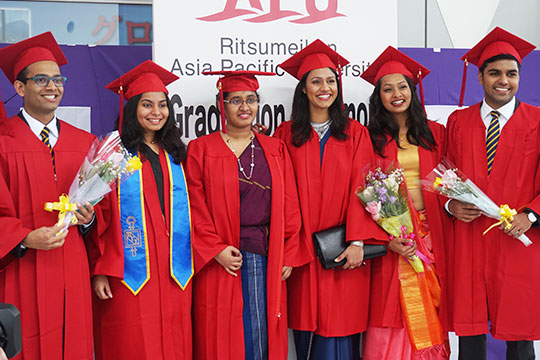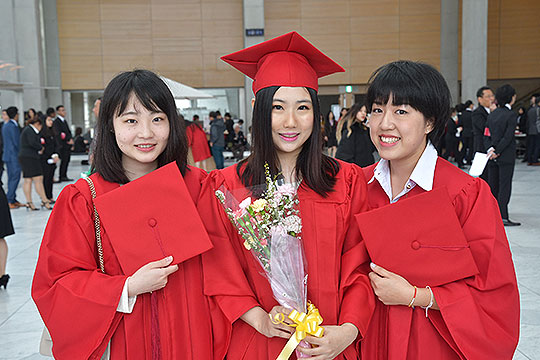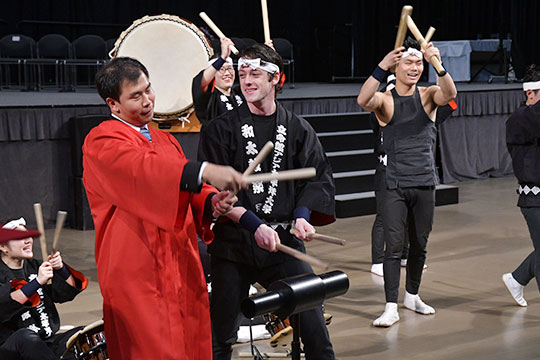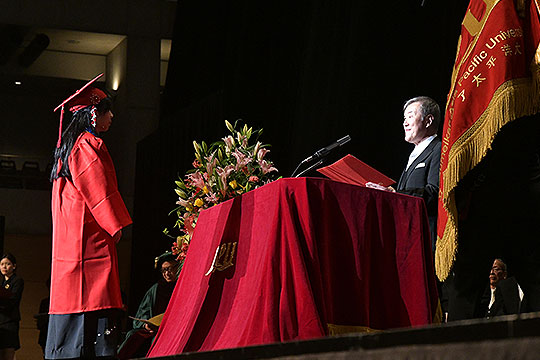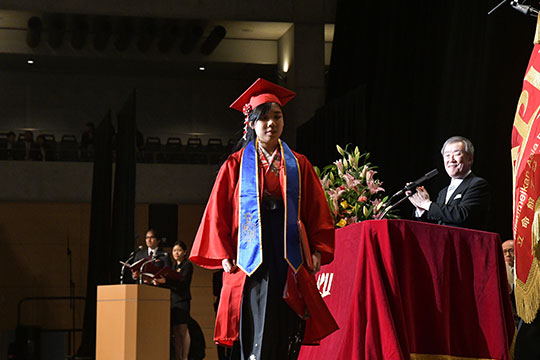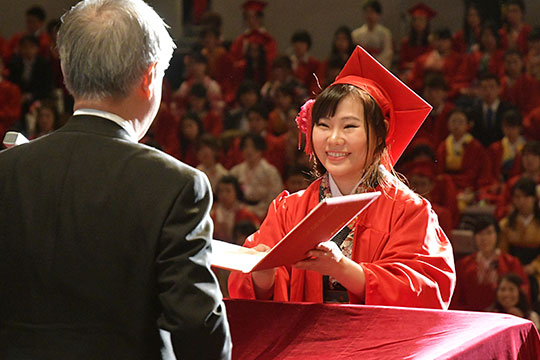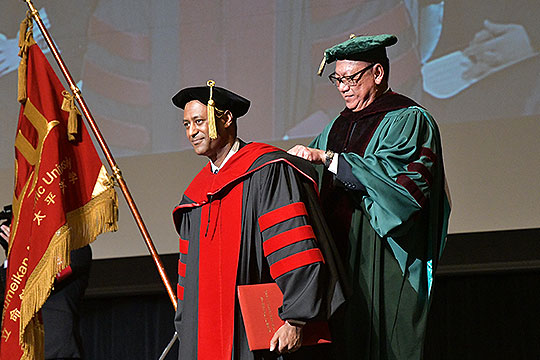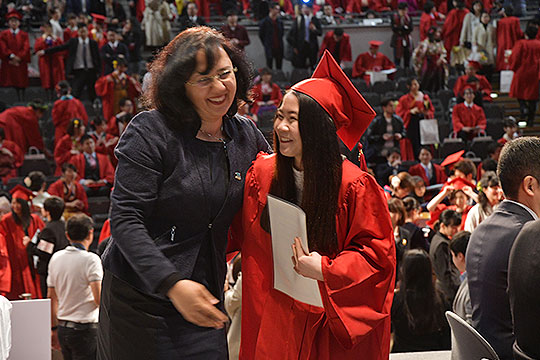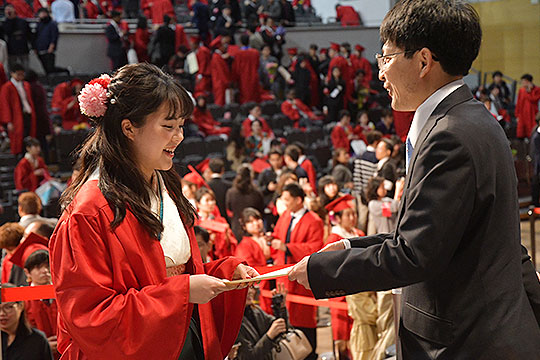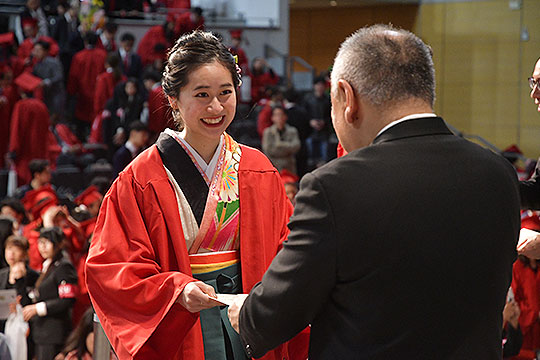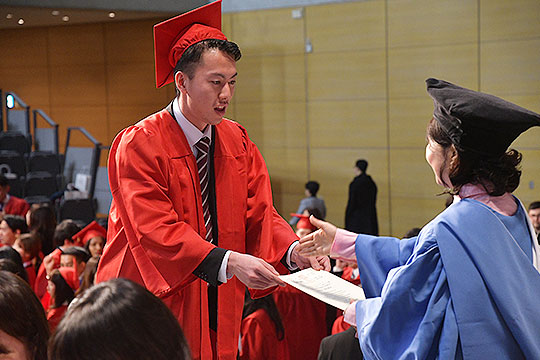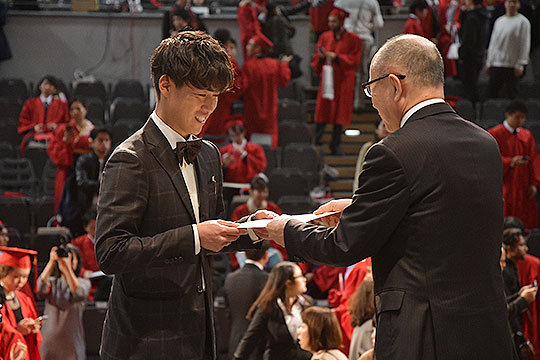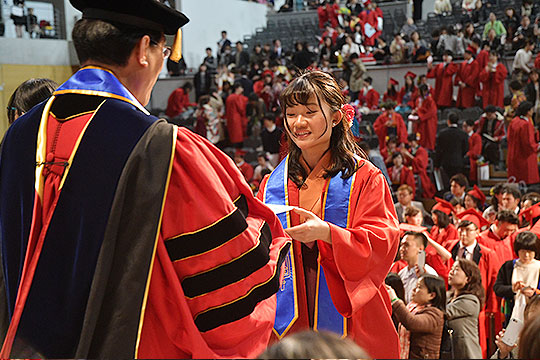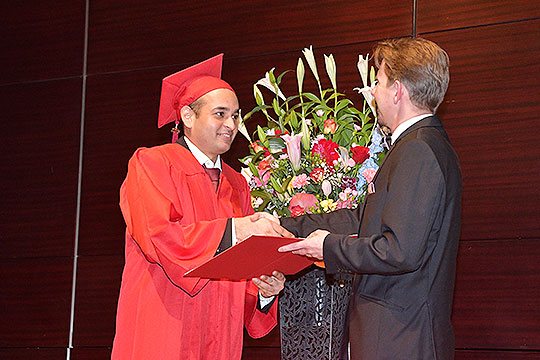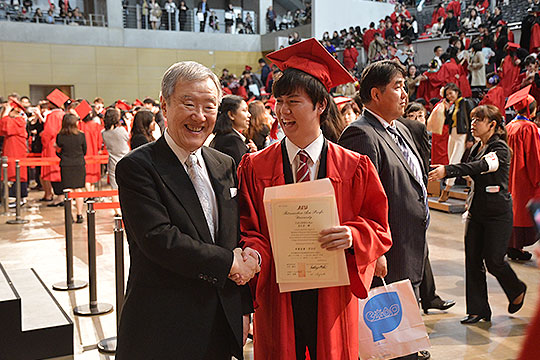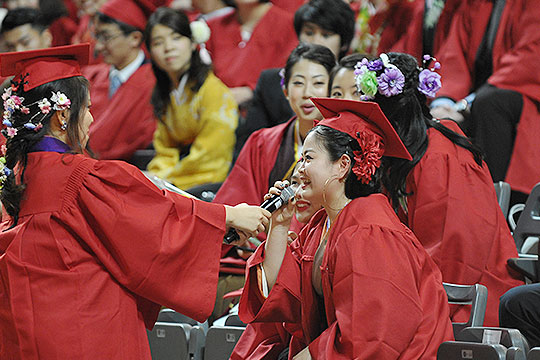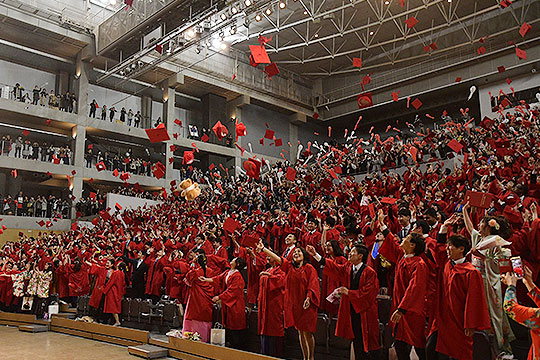First, I would like to congratulate all of you on your graduation, and together with your guardians and other guests in the audience, I would like to extend my warmest wishes as you begin the next phase of your life.
My name is Haruaki Deguchi. I was appointed President of APU on January 1st of this year, so it may be the first time for some of you to see me.
Have you ever heard of Kessennuma? It is a fishing town in Tohoku with which APU has a cooperative agreement. There, they have an event called shussen-okuri, which is held to send off fishing vessels that may sail as far as Africa.
Today, before you step into the world, I would like to send you off with three things to ponder.
First, you must understand that never before in the history of Japan has this much importance been placed on internationalization.
The first civilization in Japan arose in what is now Kitakyushu because it was close to the southern end of the Korean Peninsula, where iron was being produced. After acquiring iron through trade, the ancient Japanese were able to farm more than ever before, and productivity was soon far higher than it ever was in the Stone Age.
Animals can only survive within the limits of the resources in their ecosystem, but time and time again, humans have created rich civilizations by engaging in trade beyond the borders of their ecosystems. In other words, globalization is not a recent phenomenon, but something that began when the first human civilization was born.
The advanced industrial societies of the modern age were built on the three pillars of the Industrial Revolution: fossil fuels, iron ore, and rubber. These resources, however, do not exist everywhere in equal quantities.
This is why countries like the United States, which has these resources in abundance, can survive under an “America First” policy. Most of the world's countries, including Japan, do not have their own supply of these resources,
so they must resort to trading on the free market to create comfortable and affluent societies. I think this is the fundamental reason why such value is placed on globalization.
Secondly, it is important that you rise to the challenge. There are about 220 countries and regions in the world, and many different kinds of people live and work in each one. Trouble-free trade is only possible once you develop a firm understanding of people and the cultures and traditions of their respective countries. Trade is more than just the exchange of physical goods. Put another way, every human being has his or her own mind.
We are all different. The world is diverse. Our countries and regions are all different. And because we are different, we must be mindful of diversity. You cannot become tolerant and avoid pushing your values on others until you first understand diversity. Understanding diversity also makes it possible, or easier, to communicate with a wide range of people from all over the world.
Because it attracts students from 90 countries and regions, I like to call APU a “Young United Nations.” It was here that you learned how to understand diversity, so I believe you are well-equipped to compete with the graduates of any university around the world. Be confident in what you have done, and you will succeed in the global arena.
I am very fond and proud of the APU 2030 Vision. As you head out to every corner of the globe to pursue your aspirations or to discover what you want to do, please remember that, by using what you’ve learned at APU and thinking things through, you have “the power to change the world.”
This is an amazing vision, and I think this what the slogan “shape your world” really embodies.
Some people look at all the difficulties in the world and take a pessimistic view. But it is also possible to see that the exclusionism and authoritarianism that is emerging around the globe threatens Ritsumeikan’s founding spirit of peace and democracy.
That being said, human history is not a straight line, but a zig-zag. There are many initiatives, like the SDGs and COP23, that give us hope for the future.
I hope you will take a broad view of the world as you go out and discover what you want to do. I hope you will take action and change the world. If you cannot find your calling, keep going until you do. Life is long; there is no need to rush into things.
Some of you may have a less idealistic view of the world; you might feel that there is no way you alone can change the world. This is true. Looking at history, 99% of the people who tried to change the world failed.
But history has been made and the world has become a better place because countless people over the ages who knew that the odds were stacked against them realized that nothing will change unless you try, and they gambled on that remaining possibility of less than 1%.
There is nothing for you to fear. You are young and have plenty of time to try many different things. Even if you don’t succeed at first, remember that you are just like the vast majority of people throughout history who tried but failed.
The final thing I want to discuss is the importance of lifelong learning. Learning does not end with graduation, so I hope that once you leave here today, you will continue learning for the rest of your days.
The year 2018 marks the 150th anniversary of the Meiji Restoration when Japan transitioned to a modern nation, but why was the Meiji Restoration a success? I think it is because Japan dedicated itself to learning from the rest of the world.
Just three years after the Meiji Restoration when a framework for the new government was still in its infancy, a majority of Japan’s leaders left to study overseas. Known as the Iwakura Mission, these leaders spent nearly two years traveling the world.
In spite of, or more likely because of, this absence, Japan was able to modernize rapidly. This is precisely what Augustus, the first Roman emperor, meant when he said “make haste slowly.” Remember: nothing good comes of pride. The most important thing is to remain humble and keep learning.
Going forward, I hope you will further seek to better yourself by meeting many people, reading many books, and traveling far and wide. People, books, and travel, I believe, are the only ways that we can learn. What’s more, learning never fails to open up new opportunities in life.
Imagine you are at a ski resort. There are only two things you can do: ski or watch other people ski. Which do you think is more enjoyable? Raise your hand if you think skiing would be more enjoyable.
What I am trying to say is this: If you learn how to ski, you can choose whether you want to ski. Maybe today you want to ski. Or maybe you skied so much yesterday that you are sore and just want to watch. But if you have never learned how to ski, your only choice is to watch others ski.
Never lose your thirst for learning! The more you learn, the more options you will have. And I think that makes life all the more interesting.
Remember Kessennuma? The boats that leave port there spend six months or a year at sea before returning home. You, too, are welcome to return to APU or join an Alumni Association event at any time. The Alumni Association, which functions like a “second APU,” now has 33 chapters all over the world.
Since APU’s inception, around 15,000 students from 144 countries and regions have studied here before heading out into the world. Never forget that you are all members of one big APU Family. And nothing makes the family happier than seeing a fresh batch of new graduates ready to tackle the challenges that await them.
In closing, I leave you with these words of encouragement:
Go where nobody has gone.
Do what nobody has done.
Go and tackle unprecedented challenges and know that all of us here at APU are cheering you on!


